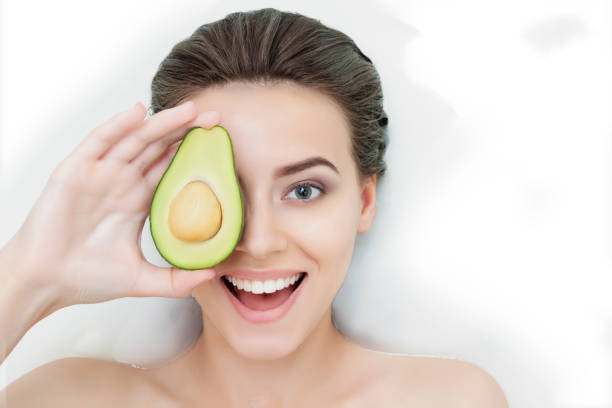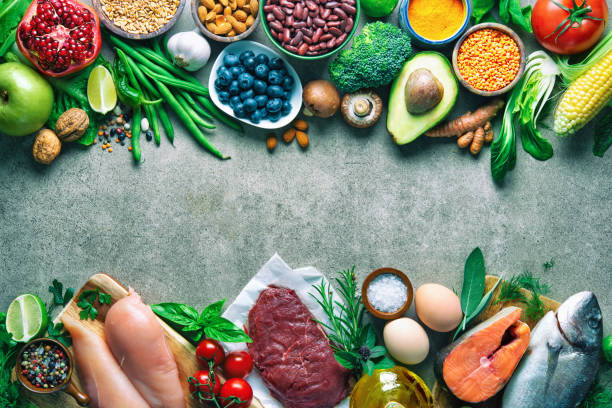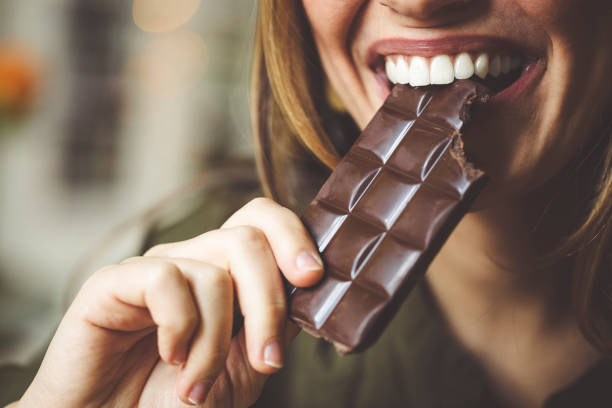Facial care
The 12 best foods for healthy skin
Table of contents
Nutrition is important for your health. An unhealthy diet can damage your metabolism, cause weight gain and even damage organs like your heart and liver.
But what you eat also affects another organ - your skin.
As scientists learn more about diet and the body, it's becoming increasingly clear that what you eat can have a significant impact on skin health and ageing.
This article takes a look at 12 of the best foods to keep your skin healthy.
1. Oily fish
Oily fish such as salmon, mackerel and herring are excellent foods for healthy skin. They are rich sources of omega-3 fatty acids, which are important for maintaining skin health.
The omega-3 fatty acids in fish reduce inflammation, which can cause redness and acne. They can even make skin less sensitive to the sun's harmful UV rays.
Some studies show that fish oil supplementation can help fight inflammatory and autoimmune conditions that affect the skin, such as psoriasis and lupus (Source ).
Oily fish is also a source of vitamin E, one of the most important antioxidants for the skin.
It is important to get enough vitamin E to protect your skin from free radical damage and inflammation.
This type of seafood is also a source of high quality proteins, which are needed to maintain skin strength and integrity.
Last but not least, fish is rich in zinc - a mineral that is important for regulating the following:
- inflammation
- general skin health
- production of new skin cells
Zinc deficiency can lead to skin inflammation, ulcers and delayed wound healing (Source).
SUMMARY
Fatty fish such as salmon contain omega-3 fatty acids that can reduce inflammation and keep skin moisturised. They are also a good source of high-quality protein, vitamin E and zinc.
2. Avakado
It's important to get enough of these fats to keep your skin flexible and moisturised.
A study of over 700 women found that a high intake of fat - especially the types of healthy fats found in avocados - was associated with smoother, healthier skin. (Source).


Research also shows that avocados contain compounds that can help protect the skin from sun damage. UV damage to the skin can cause wrinkles and other signs of aging.
Avocados are also a good source of vitamin E, which is an important antioxidant that helps protect skin from oxidative damage. Most people in Nordic countries do not get enough vitamin E from their diet.
Interestingly, vitamin E seems to be more effective when combined with vitamin C.
Vitamin C deficiency is rare today, but common symptoms include dry, rough and scaly skin that tends to bruise easily.
Vitamin C is also an antioxidant that helps protect the skin against oxidative damage caused by the sun and the environment, which can lead to signs of ageing.
A 100-gram serving, or about 1/2 an avocado, provides 14 % of Daily Value (DV) for vitamin E and 11 % of DV for vitamin C.
SUMMARY
Avocados are high in healthy fats and contain vitamins E and C, which are important for healthy skin. They also contain compounds that can protect the skin from sun damage.
3. Walnuts
Walnuts have many properties that make them an excellent food for healthy skin.
They are a good source of essential fatty acids, which are fats that the body can't make on its own, and they are also richer than most other nuts in both omega-3 and omega-6 fatty acids.
A diet high in omega-6 fats can promote inflammation, including inflammatory skin conditions such as psoriasis. On the other hand, omega-3 fats reduce inflammation in your body - including your skin. While omega-6 fatty acids are abundant in the Western diet, sources of omega-3 fatty acids are rare.
Because walnuts contain a good ratio of these fatty acids, they can help combat the potential inflammatory response to excess omega-6.
Walnuts also contain other nutrients that your skin needs to function properly and stay healthy.
One ounce (28 grams) of walnuts contains 8 % of DV for zinc.
Zinc is essential for the skin to function properly as a barrier. It is also necessary for wound healing and for fighting both bacteria and inflammation.
Walnuts also provide small amounts of the antioxidants vitamin E and selenium, in addition to 4-5 grams of protein per ounce (28 grams).
SAMMANFATTNIN
Walnuts are a good source of essential fats, zinc, vitamin E, selenium and protein - all of which are nutrients your skin needs to stay healthy.
4. Sunflower seeds
Nuts and seeds are generally good sources of skin-strengthening nutrients.
Sunflower seeds are an excellent example.
One ounce (28 grams) of sunflower seeds contains 49 % of the daily dietary allowance for vitamin E, 41 % of the daily dietary allowance for selenium, 14 % of the daily dietary allowance for zinc, and 5.5 grams of protein (Source).
SUMMARY
Sunflower seeds are an excellent source of nutrients, including vitamin E, which is an important antioxidant for the skin.
5. Sweet potatoes
Beta-carotene is a nutrient found in plants.
It acts as a provitamin A, which means it can be converted into vitamin A in the body.
Beta-carotene is found in oranges and vegetables such as carrots, spinach and sweet potatoes.
Sweet potatoes are an excellent source - a 100-gram (1/2 cup) serving of baked sweet potatoes contains enough beta-carotene to provide more than six times the recommended dose of vitamin A (Source ).
Carotenoids like beta-carotene help keep skin healthy by acting as a natural sunscreen.
When you eat this antioxidant, it is incorporated into the skin and helps protect skin cells from sun exposure. This can help prevent sunburn, cell death and dry, wrinkled skin.
Interestingly, high levels of beta-carotene can also give the skin a warm orange colour, which contributes to an overall healthier appearance.
SUMMARY
Sweet potatoes are an excellent source of beta-carotene, which acts as a natural sunscreen and can protect the skin from sun damage.
6. Red or yellow peppers
Peppers, like sweet potatoes, are an excellent source of beta-carotene, which the body converts into vitamin A.
150 grams of chopped red peppers contain the equivalent of 156 % of DV for vitamin A.
They are also one of the best sources of vitamin C. This vitamin is necessary for creating the protein collagen, which keeps the skin firm and strong.
SUMMARY
Peppers contain plenty of beta-carotene and vitamin C - both important antioxidants for your skin. Vitamin C is also essential for creating collagen, the structural protein that keeps your skin strong.
7. Broccoli
Broccoli is full of vitamins and minerals important for skin health, including zinc, vitamin A and vitamin C.


It also contains lutein, a carotenoid that acts like beta-carotene. Lutein helps protect the skin from oxidative damage, which can cause skin to become dry and wrinkled.
But broccoli also contains a special compound called sulforaphane, which contributes some impressive benefits. It may even have cancer-preventing effects, including on certain types of skin cancer.
In laboratory tests, sulforaphane reduced the number of skin cells killed by UV light by as much as 29 %, with protection lasting up to 48 hours.
There is evidence that sulforaphane may also help maintain collagen levels in the skin.
SUMMARY
Broccoli is a good source of vitamins, minerals and carotenoids that are important for skin health. It also contains sulforaphane which can help prevent skin cancer and protect the skin from sunburn.
8. Tomatoes
Tomatoes are a good source of vitamin C and contain all the main carotenoids, including lycopene.
Beta carotene, lutein and lycopene have been shown to protect the skin against damage from the sun. They can also contribute to prevention wrinkles.
As tomatoes are rich in carotenoids, they are an excellent food for maintaining healthy skin.
Consider combining carotenoid-rich foods such as tomatoes with a source of fat, such as cheese or olive oil. Fat increases your absorption of carotenoids.
SUMMARY
Tomatoes are a good source of vitamin C and all the major carotenoids, especially lycopene. These carotenoids protect the skin against sun damage and can help prevent it wrinkles.
9. Soy
Soy contains isoflavones, a category of plant compounds that can either mimic or block estrogen in the body.
Isoflavones can benefit several parts of your body, including your skin.
In post-menopausal women, soy can also improve skin dryness and increase collagen, which helps keep skin smooth and strong.
These isoflavones not only help protect the cells in the body from damage, but also the skin from UV radiation - which can reduce the risk of certain skin cancers.
SUMMARY
Soy contains isoflavones that have been shown to improve wrinkles, collagen, skin elasticity and dryness, and protect skin from UV damage.
10. Dark chocolate
If you need another reason to eat chocolate, here it is: The effects of cocoa on your skin are pretty phenomenal.


After 6-12 weeks of daily consumption of a cocoa powder high in antioxidants, participants in one study experienced thicker, more moisturised skin.
Your skin was also less rough and scaly, less susceptible to sunburn and had better blood flow - providing more nutrients to the skin.
Several other studies have observed similar results, including improvements in wrinkles. Keep in mind, however, that at least one study found no significant effects.
Be sure to choose dark chocolate with at least 70 % cocoa to maximise the benefits and keep added sugar to a minimum.
SUMMARY
Cocoa contains antioxidants that can protect the skin against sunburn. These antioxidants can also improve wrinkles, skin thickness, hydration, blood flow and skin texture.
11. Green tea
Green tea can help protect the skin from damage and ageing.
The powerful compounds found in green tea are called catechins and work to improve skin health in several ways.
Like many other foods that contain antioxidants, green tea can help protect your skin from sun damage.
A 12-week study of 60 women showed that drinking green tea daily could reduce redness from sun exposure by up to 25 %.
Green tea also improved the moisture, roughness, thickness and elasticity of their skin.
SUMMARY
The catechins found in green tea are powerful antioxidants that can protect skin from sun damage and reduce redness, as well as improve skin hydration, thickness and elasticity.
12. Red grapes
Red grapes are known to contain resveratrol, a compound that comes from the skin of red grapes.
Resveratrol is attributed with a host of health benefits, including reducing the effects of ageing.
Test studies suggest it may also help slow the production of harmful free radicals, which damage skin cells and cause signs of ageing.
This beneficial compound is also found in red wine. Unfortunately, there's little evidence that the amount of resveratrol you get in a glass of red wine is enough to affect your skin.
And because red wine is an alcoholic beverage, there are negative effects of drinking it.
It is not recommended to start drinking red wine just because of its potential health benefits. Instead, you should increase your intake of red grapes and berries.
SUMMARY
Resveratrol, the famous antioxidant found in red grapes, can slow down the skin's ageing process by degrading harmful free radicals that damage the skin.
Conclusion
What you eat can have a significant impact on your skin health.
Make sure you get enough essential nutrients to protect your skin. The foods on this list are great options to keep your skin healthy and strong!



